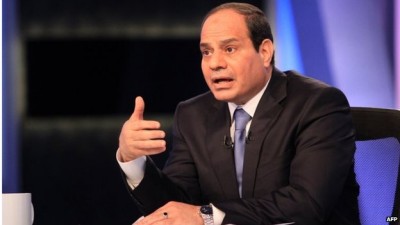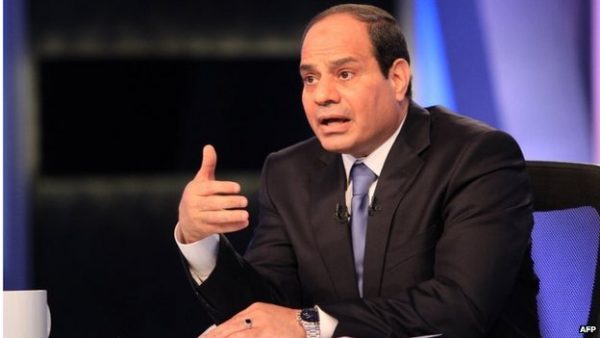 Former Egyptian army chief Abdul Fattah al-Sisi’s first major TV interview of his presidential campaign was well-received by his numerous supporters, but it is a different story among the country’s top liberal social media figures.
Former Egyptian army chief Abdul Fattah al-Sisi’s first major TV interview of his presidential campaign was well-received by his numerous supporters, but it is a different story among the country’s top liberal social media figures.
In the interview broadcast on Monday, Mr Sisi, who is the overwhelming favourite to win the 26-27 May vote, said the Muslim Brotherhood would cease to exist if he is elected.
He also insisted the army would have no role in running Egypt, and defended a law restricting protest.
Usually praised – even lionised – in the mainstream media, Mr Sisi faces a far tougher audience in social media, where pro-democracy campaigners, human activists and liberal commentators dominate the tone of discussion.
‘Shame’
Many have come out in implacable opposition to Mr Sisi. The online reaction of TV sports presenter Alaa Sadek, who strongly opposes the military-backed government that ousted the Muslim Brotherhood last year, was fairly typical of these.
“The most stupid presidential candidate in the world is talking,” he tweeted during the interview. “If Sisi becomes president, every respectable person will bow their head in shame.”
Leftist activist Alaa Abd El Fattah was particularly harsh in his assessment of the former defense minister.
“Sisi is a slaughterer,” he said, referring to the security forces’ crackdown on pro-Muslim Brotherhood protesters last year, in which many hundreds were killed.
“Those who will vote for him want us to be ruled by a slaughterer. Frankly, they want bloodshed and they are participants in the crime.”
Positive traits ‘personal’
But even those seemingly ready to give Mr Sisi the benefit of the doubt declared themselves unimpressed by the former field marshal’s mettle as a presidential candidate.
“I have concluded from this interview that al-Sisi’s positive traits – of which there are many – are purely ‘personal’, and have nothing to do with politics or the post of the president of the republic,” Blogger and TV presenter Ahmad Esseily tweeted.
Human rights lawyer Gamal Eid said the interview had convinced him to vote for Mr Sisi’s only challenger in the election, left-winger Hamdeen Sabahi.
The Facebook account of the liberal Dostour (Constitution) Party, which was founded by the former International Atomic Energy Agency chief Mohammed ElBaradei, picked up on what it took to be signals of a mindset that is unwilling to listen to others on Mr Sisi’s part.
Pointing out that Mr Sisi at one point burst out to the two interviewers: “Are you here to listen or talk?”, the page said: “This is proof that he does not accept discussion. [Discussion] requires that one should talk and listen rather than behaving as if he is addressing the army.”
The Facebook page of the liberal activist 6 April Youth Movement clearly took the view that Mr Sisi had been dishonest in large parts of the interview, setting its readers a mock competition to come up with three lies uttered by him.
In comments on the page, Ahmad al-Ghul responded by saying that it would have been better to turn the question around and ask “State one true thing he said”.
‘So talented’
It was not all bad reviews for Mr Sisi, however. The many Egyptians who see in the former army chief a hope for stability and a bulwark against Islamist rule also have their representatives on social media.
Writer Fatima Naout, a strong critic of the Muslim Brotherhood, was almost gushing in her assessment of the interview: “Sisi is quick-witted, so talented in choosing his words.”
The Facebook page “I Am Sorry Mr President, which is sympathetic to the military and ousted President Hosni Mubarak, praised the former army chief for his tough response when confronting one of the interviewers for using the negatively-tinged expression “askar” to describe members of the armed forces.
“Sisi had a swift, firm reply. He said: ‘I will not allow you to say ‘askar’ again.”
In the comments, one user, Ashraf Ramzi, seemed to sum up the mood of Sisi supporters: “I thank God who proved that this country cannot be ruled by anybody but the men of the armed forces.”
BBC


Leave a Reply
You must be logged in to post a comment.